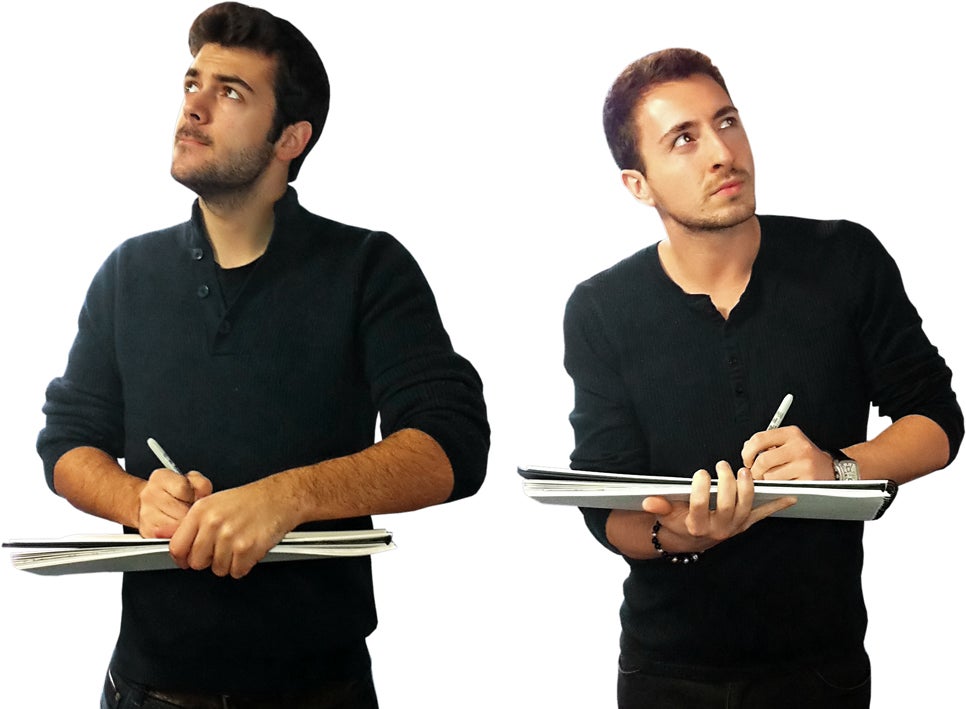Advertising careers: If at first you can't succeed, why not do it yourself?
This is the story of two young grads, frustrated at the sheer lack of career opportunities left to them, who decided to take a radical approach to finding work in the advertising industry

Someone once said that advertising wasn’t about high intellect but about low cunning. Perfect. This will define this story: the story of two students, one Italian, one Swiss, trying to make their way into the advertising industry after their Masters at Leeds University.
The idea
Going through the graduate scheme application process for London’s advertising agencies can be quite intimidating. If you’re lucky, you’ll be offered 10 minutes on Skype to complement whatever it is you managed to fill their questionnaires with. While doing so, you're always having to keep in mind that they believe they are different to the others, and that they want you to be different as well. Ironically, this belief in their difference probably constitutes one of their most solid common traits.
Eventually, one of us whined about how refreshing it would be to flip the table around and ask people to impress us, instead of constantly trying to impress others. “Say that again?” asked the other; an idea had started shaping.
We decided to create a fictitious agency. With its own scouting scheme, it would be designed to prove that we could pass for professionals and make people want to work for us. We called it Isennit (inspired by the fact the British, it seems to us, love to end their sentences with a question).
What it meant we had to do
Passing for an agency meant having a website, sure, but could we pass ourselves off as an ad agency without ads, without clients? Not a chance. While working on pieces and campaigns for nine different brands, we developed a personality for our ‘business’. Knowing that we would look small no matter what - otherwise, clients would’ve known about us already - we knew we needed character if we wanted people to get on board with us.
We decided that our work and tone would be defined by the concept of happic (being happy and epic). That little touch of funkiness was all over our descriptions, our questionnaire and of course our ‘corporate’ video presenting the hypothetical team.
Contacting the schools
The next step was to get applicants. If we had nice tutors recommending graduate schemes to us, we thought other programmes might as well. People tend to trust academics about this sort of thing, after all.
We therefore contacted the best advertising schools in the UK and the world to tell them we wanted to be impressed by their graduates. Buckets of emails later, these schools recommended us their brilliant creative sprouts, many of whom were already out there in the wild. Some programmes even invited us over for portfolio reviews. Others suggested we could create partnerships.
Examining applications
Every day we received more and more applications. They were art directors, copywriters, illustrators, photographers, and designers, from places like Barcelona, Cape Town, Hamburg, Stockholm, Amsterdam, Milan, Miami or Singapore. Many showed loads of enthusiasm and made us smile, or even laugh.
Granted, they had to answer questions like 'convince us to quit our jobs and become any animal in the big blue world' and it is quite hilarious to have someone try their best to praise the virtues of lamas or octopuses; but they also had to submit some creative work and show original thinking.
Results
In a little over two weeks, 105 young creatives applied to our scouting scheme. Some of them were ready to leave their jobs behind before joining us in Switzerland. They wanted to work for us and learn from us; now that’s an ego trip for you. Beyond the thousands of unique visitors and hundreds of video views, it was great to see that many of them really embraced our happic and outgoing attitude, showing a lot of passion doing so.
The best part is that we never lied. We never said we were an agency; we said 'international team'. We never promised a job; we just said 'we want to be impressed'. People just read what they wanted to read. Blessed be the power of suggestion.
The aftermath
We do have a heart, despite what you might think (two of them, as a matter of fact). Some candidates really overwhelmed us with their enthusiasm as well as their quality. We decided to reward some of the worthy participants by giving them as much visibility as the project will end up getting in the press, as well as the chance to be reviewed and advised by some top creative directors from the industry.
Beyond giving us real sense of what makes the difference between a brilliant and a dull application, this project has taught us what out-of-the-box thinking can sometimes lead to. Sadly it seems that in this business it is often not enough to be good, you have to be surprising as well.
Charles Nouveau and Gianmarco Mariotti are founders of isennit.com
Join our commenting forum
Join thought-provoking conversations, follow other Independent readers and see their replies
Comments
Bookmark popover
Removed from bookmarks